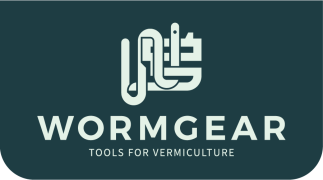Frequently Asked Questions
WHAT IS THE OUTPUT OF A MICHIGAN SOILWORKS CFT?
- Single module: 5 cu.ft./week or about 10 yards/year
- Full line (5 modules): 25 cu.ft./week or 48 yards/year
Each 4×8 ft module will produce about 5 cubic feet of vermicompost per week, or 10 yards per year. Typically, you will screen this harvested material for size and quality. You can expect the screened ‘overs’ to amount to 15 to 20%, which yields 5 cubic feet of finished product per week.
Note: Much of the screened overs can be recycled back to the bin for another trip through, including larger or woody pieces and any worms that came with the harvest. Any rocks or debris should be removed of course.
HOW MUCH WASTE MATERIAL CAN A MICHIGAN SOILWORKS CFT PROCESS?
Pre-composted materials like manure may reduce 10% further in the CFT.
- Single module: 5.2 cu.ft./week or about 12 yards/year
- Full line (5 modules): 26.7 cu.ft./week or 58 yards/year
Fresh materials like food scraps with shredded cardboard can reduce up to 50%.
- Single module: 10 cu.ft. /week or about 20 yards/year
- Full line (5 modules): 50 cu.ft. /week or 96 yards/year
Your additions will equal the amount harvested plus the amount of reduction from decomposition in the CFT.
The amount of reduction will depend on the condition of the material when it is added. This includes the size of the pieces, the type of material, and and the amount of decomposition already started.
WHAT ARE THE SIZES OF YOUR CFTS?
Michigan SoilWorks CFTs are modular, and each section is 4 feet wide by 8 feet long. These can be used individually or assembled together into lines up to 5 modules long (40 feet). Multiple lines are banked together in parallel for larger installations.
HOW MUCH SPACE DO I NEED AROUND A MICHIGAN SOILWORKS CFT?
At each end of the CFT are extensions for the motor drive or hand winch. These are about 18” each.
For access to the motor controls or the hand winches, we recommend a minimum of 5 ft clearance at each end.
If the main work area is along side the CFT, then 8 ft is ideal, allowing for use of long-handled tools. But smaller spaces can still work well by adapting your process to fit the space available.
The back side needs just a minimum of clearance for occasional access.
CAN I BUY THE PLANS AND BUILD THIS CFT MYSELF?
Yes you can!
Our Plans Package includes the complete set of drawings used by our production team, and includes our patented Cutting Bar which we will ship directly to you.
For countries outside of the US and Canada, you’ll want to order our metric version.
Order directly online on our Plans Pricing page!
WHAT KIND OF WORMS SHOULD I USE IN MY CFT?
The Continuous Flow system uses a type of earth worm referred to as epigeic. These species tend to live just below the surface and not burrow deeply. The worms listed below are the most appropriate for CFTs. And the species you use can depend upon your climate conditions.
Note: If you are vermicomposting in a climate-controlled environment, you may have more flexibility in selecting your preferred species.
Temperate Species
- Eisenia fetida (Red wiggler), along with similar species Eisenia Andrei and Lumbricus rubellus
- Eisenia hortensis (European nightcrawler, sometimes known as ENC’ or Belgians), alt. classification Dendrobaena veneta.
Note: European nightcrawlers burrow deeper than red wigglers and may escape through the CFT bottom.
Tropical Species
- Perionyx excavatus (Malaysian / Indian Blue)
- Eudrilus eugeniae (African nightcrawler, ‘ANC’)
Note: African nightcrawlers tend to burrow deeper than red wigglers.
HOW MANY WORMS SHOULD I PURCHASE FOR MY MICHIGAN SOILWORKS CFT?
We recommend starting with 20 lbs. of worms per module.
With ideal conditions, the population will grow to a density of nearly 2 lbs per square foot within a few months. When the population reaches its peak for the living conditions, it stabilizes and reproduces just to maintain those levels.
A sometimes-used rule of thumb for stocking density is 1/2 lb. per square foot, but this results in a longer time getting the production rate established.
CAN I BREED WORMS IN A CFT TO SELL THEM?
While you would have excellent reproduction rates in your Michigan SoilWorks CFT, these systems are designed for optimum vermicompost production rather than vermiculture.
Typically tray- or pail-based systems are preferred when worms are intended for sale and their castings are just a byproduct.
WHAT IS THE PAYBACK TIME ON A MICHIGAN SOILWORKS CFT?
On average, you can expect a 16-month payback period for your CFT investment. This accounts for 16 weeks of startup time followed by your first 10-12 months of sales.
Larger systems have a shorter breakeven period.
Another factor is the price you can get for vermicompost in your market. Product from Michigan SoilWorks CFT’s has the highest quality by biological assays and as a result can justify a premium price compared to other sources.
Also, if you are processing your own waste stream you can avoid waste disposal fees and further improve your return on investment.
IS THERE FINANCING AVAILABLE FOR A CFT PURCHASE?
Yes, we can help arrange financing through agricultural equipment financing firms like Farm Credit Leasing Services Corporation and others.
I AM LOCATED OUTSIDE OF THE US OR CANADA. CAN I STILL PURCHASE A MICHIGAN SOILWORKS CFT?
Yes, we can work with you to arrange exporting if your order is 2 or more 5-module CFTs. If you can arrange your own shipping, we will be able to support you with any size.
You will need to retain your own local agent to help you with your country’s logistics, duties and taxation.
We are currently exploring local distribution in Australia and Europe. Note: If you need to import composting worms, you must check with your local customs officials for approved species in your country.

